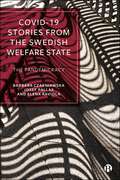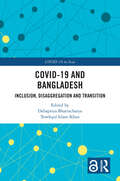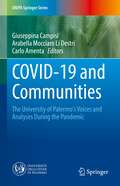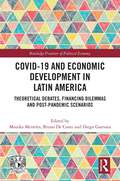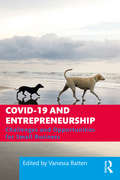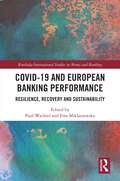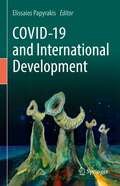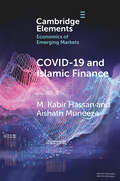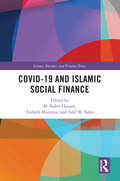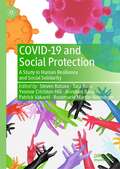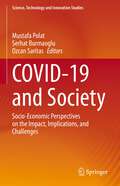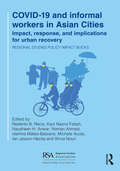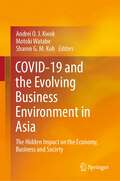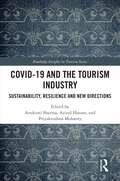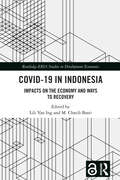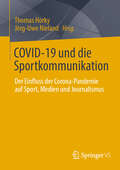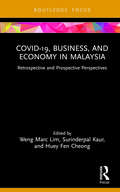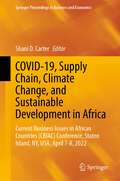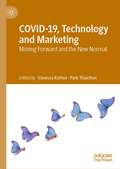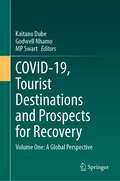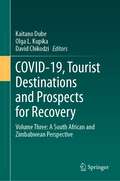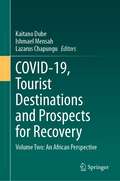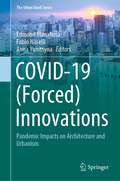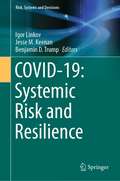- Table View
- List View
COVID-19 Stories from the Swedish Welfare State: The Pandemicracy
by Barbara Czarniawska Josef Pallas Elena RaviolaThis book offers a unique perspective on Sweden’s COVID-19 response in its publicly funded welfare sector, which was initially highly criticised but later recognised as exemplary on the global stage in the aftermath of the pandemic. Using diaries, stories and interviews from 73 workers across 30 professions, it reveals the everyday experiences of those maintaining welfare services, both on the front lines and behind the scenes. Covering 2020 to 2022, it spans major cities and smaller municipalities across Gothenburg, Uppsala and Stockholm and introduces 'pandemicracy,' a concept exploring pandemic-era governance and organisation of the public sector. This insightful analysis sparks a wider discussion on adapting to unforeseen challenges in public welfare.
COVID-19 Testing at Everlywell
by Jeffrey J. Bussgang Olivia HullIn March 2020, as COVID-19 spreads rapidly across the U.S., Everlywell founder Julia Cheek considers how to respond as a small start-up specializing in at-home lab testing. After making dramatic budget cuts, she decides to pivot the organization to address the country's testing shortage. But after a hectic few weeks building capacity at her partner labs to 30,000 COVID daily tests, the U.S. Food and Drug Administration (FDA) releases a statement warning the public that it has not granted approval for at-home tests. Cheek must decide whether to return to her core business or persist in focusing her nascent organization on COVID-19 tests, an opportunity whose commercial merit is unclear.
COVID-19 and Bangladesh: Inclusion, Disaggregation and Transition (COVID-19 in Asia)
by Debapriya Bhattacharya and Towfiqul Islam KhanCOVID-19 and Bangladesh analyzes the aftermath of the COVID-19 pandemic and features the socioeconomic fallouts for disadvantaged communities in Bangladesh, their coping mechanisms, and implications for the country’s development ambitions.The contributors to the book examine the immediate impact of economic adversities, which rapidly translated into health, employment, education, and other socioeconomic problems. They show that the pandemic has disproportionately impacted the communities that were traditionally left behind and created a new group of people that are “pushed behind”. Structured in four sections, the book examines impact and adjustment in the areas of employment, income, and expenditure and health, education, and the Sustainable Development Goals (SDGs) and offers policy perspectives. The empirical analysis and policy conclusions presented in the chapters are based on official secondary data, household-level primary surveys, focus-group discussions, key informant interviews, and reviews of public policy documents. The policy conclusions and outlook presented in the book can be instructive for other low-middle income, or graduating least developed countries (LDC).A unique contribution to the current debate on the diverse implications of the COVID-19 pandemic, this book will be of interest to policymakers and academics studying health and society in Asia and other countries of the Global South.
COVID-19 and Communities: The University of Palermo's Voices and Analyses During the Pandemic (UNIPA Springer Series)
by Giuseppina Campisi Arabella Mocciaro Li Destri Carlo AmentaThis volume presents an interdisciplinary reflection on the SARS-COV-2 pandemic and its consequences elaborated in real-time. It embodies the University of Palermo’s values and mission by bringing together academics of very diverse disciplinary fields on an issue that is disrupting all aspects of individual and community existence. This volume captures the voices of academics during the pandemic, allowing to crystallize the discourses that are emerging in a wide variety of scientific fields as events unfold and knowledge is rapidly evolving. They share the belief that to shed adequate light on the complex and multifaceted phenomenon of the COVID-19 pandemic and its consequences necessarily requires the adoption of an interdisciplinary approach, the consideration of a multiplicity of perspectives, and of a variety of levels of analysis. The organization of the single contributions in chapters allows the exchange of different perspectives, whilst conveying a general overall framework to the interpretation of the many facets of the changes and crisis generated by COVID-19.The volume addresses both academics and professionals dealing with the processes and the consequences brought forth by the pandemic and presents a solid example of the commitment an academic institution should devote to society and communities.
COVID-19 and Economic Development in Latin America: Theoretical Debates, Financing Dilemmas and Post-Pandemic Scenarios (Routledge Frontiers of Political Economy)
by Monika Meireles Diego Guevara Bruno De ContiThe impact of the COVID-19 pandemic on the global economy, just as with the Great Recession a decade earlier, has served to reinforce the fact that the world is hierarchically organized and the distribution of power between countries is distinctly asymmetric. Gathering multiple viewpoints of Latin American researchers, this book explores the impacts of the pandemic, including unequal access to vaccines and recovery finance, on economies in the region. The book is organised in three substantial sections: the first brings together conceptual work which rethinks the fundamental categories for critical thinking on the challenges for Latin American development in a post-pandemic scenario. In the second part, the chapters focus on studying the Latin American financial reconfiguration that is being driven by the pandemic, particularly through a comparison of the experience of countries of the world economy’s core and periphery. Finally, the third part evaluates the concrete experiences of different Latin American countries in this very specific historical moment, emphatically analyzing the economic policy responses that the governments are adopting to deal with the current sanitary emergency and its economic and social effects. From this, the book suggests keystone elements for the relaunch of development strategies in the region as it recovers from the pandemic. This book will be of particular interest to readers of critical or heterodox perspectives on the economics of the pandemic, Latin American development and emerging economies.
COVID-19 and Entrepreneurship: Challenges and Opportunities for Small Business
by Vanessa RattenAmid the COVID-19 pandemic, small businesses are especially vulnerable. This is one of the first books that explicitly examines the linkage between crisis and entrepreneurship with a specific focus on small businesses. The book adopts a holistic approach and outlines strategies that small business owners can utilize as well as business opportunities that are available in these new market conditions. It also provides a comparative analysis of the current and future market conditions to enable a better understanding of how institutional structures can facilitate or hinder growth. The book also goes on to explain why and how creativity and innovation can help to mitigate the impact of such a crisis on business and highlights why business continuity is especially crucial to family-owned businesses. This timely publication will help to guide small business owners and entrepreneurs to maintain business continuity and build up their resilience in a challenging business climate.
COVID-19 and European Banking Performance: Resilience, Recovery and Sustainability (Routledge International Studies in Money and Banking)
by Paul Wachtel Ewa MiklaszewskaThe monograph presents a comprehensive analysis of the impact of the COVID-19 pandemic on European banking, both at a macro and a micro level. It analyses the impact of the pandemic on bank stability, performance and credit policies, as well as their strategic adjustments to the challenges brought about by the COVID-19 pandemic. The initial chapters analyze the various governmental responses to the pandemic. Topics of discussion include the scale and scope of the wide range of public policies undertaken to mitigate the consequences of the crisis, and their efficiency in limiting the negative impact of the pandemic on the economy. The results suggest that the extensive public interventions have been largely successful in averting the possible disastrous consequences for the financial sector on a macro level. On a micro level, the COVID-19 pandemic has disrupted the restructuring and recovery of the banking industry started after the 2008 crisis which has had a significant impact on economies around the world, arguably leading to a negative long-lasting effect on sustainable development. To examine this, the book focuses on the impact of the pandemic on bank lending policies, bank stability and performance, and on competitive position of the banks vis a vis the FinTech sector. Offering a thorough overview of the issues that banks will have to face as a consequence of pandemic related macroeconomic and industry adjustments, the book will be of interest to scholars, researchers and students of banking and finance as well as banking specialists concerned with the impact of crises on financial markets, risks and resilience.
COVID-19 and International Development
by Elissaios PapyrakisThe current coronavirus pandemic fundamentally reshapes existing debates and processes in international development. The unprecedented (and rapidly evolving) crisis is generating a number of substantial challenges for developing economies. Governments in low-income nations often find it extremely hard to cope with the increased demand for health services, make prompt decisions and put them into action, protect vulnerable segments of society and offer immediate relief to affected economic sectors. This book provides a series of reflective chapters that demonstrate how several areas of international development have been severely affected by the Covid-19 outbreak. It provides an in-depth critical discussion on how the current pandemic influences several development outcomes (in the domains of poverty/inequality, health, education, migration, formal/informal employment, (de)globalisation, the extractive sector, climate change, water and the global financial system). Each chapter draws policy recommendations on relevant interventions that can alleviate the identified negative repercussions of the Covid-19 pandemic, especially for the most vulnerable communities in the Global South.
COVID-19 and Islamic Finance (Elements in the Economics of Emerging Markets)
by M. Kabir Hassan Aishath MuneezaThe objective of this Element is to provide an overview of Islamic finance by highlighting the impact of the pandemic on it in a comprehensive manner by looking at two branches of Islamic finance: Islamic commercial finance; and Islamic social finance. The approach that is adopted in this Element is to first provide an overview of Islamic finance to the readers in a simple and easy manner followed by the impact of pandemic discussed separately for both types of Islamic finance. Last, but not least, the Element also recommends ways in which Islamic finance could be further improved in the light of the lessons learnt from the pandemic. It is anticipated that the recommendations made in this regard would assist policymakers, practitioners, researchers and other stakeholders of Islamic finance to understand the way to unlock the full potential of Islamic finance to reduce the wealth gap and achieve financial inclusion.
COVID-19 and Islamic Social Finance (Islamic Business and Finance Series)
by M. Kabir Hassan, Aishath Muneeza, and Adel M. SareaIt is said that the COVID-19 pandemic has turned back the poverty clock. As such, there is a need to have social mechanisms put in place to provide relief to those who are affected in this regard. Islamic social finance consists of tools and institutions that could be used to alleviate poverty. This book explores the impact of COVID-19 on Islamic finance to better understand the effectiveness of Islamic social finance in helping those who have been affected by poverty overnight due to the halt in all major economic activities in the context of the pandemic. Since the struggle against poverty in each country will be different, the book attempts to shed light on the experiences of different countries by presenting successful models of Islamic social finance. The book first looks at poverty and COVID-19 before delving into the role of Islamic social financial institutions and how they have risen against COVID-19. The book concludes by examining the impact of COVID-19 on Islamic microfinance. This book is the first of its kind on the subject of COVID-19, and it intends to bridge the gap in the literature.
COVID-19 and Social Protection: A Study in Human Resilience and Social Solidarity
by Yvonne Crichton-Hill Tara Ross Patrick Vakaoti Steven Ratuva Arindam Basu Rosemarie Martin-NeuningerThis book provides a comparative analysis of how communities have developed people-based resilience in response to the global impact of COVID-19. The crisis of the capitalist economy due to border closure, downturn in business, loss of jobs and large-scale destruction of people’s well-being has worsened poverty, and inequality worsened the situation of the already marginalized. At the same time, it has provided the opportunity for indigenous and marginalized communities to innovatively strengthen their social and solidarity economies to respond the unprecedented calamity in a self-empowering and sustainable way. The book explores some of the ways in which local communities have mobilized their cultural resources to strengthen their social solidarity and mitigating mechanisms against the continuing global calamity. It looks at how different communities approach social protection as a way of sustaining their well-being outside the parameters of the ailing market economy and how some of these can provide valuable lessons for strengthening resilience for the future.
COVID-19 and Society: Socio-Economic Perspectives on the Impact, Implications, and Challenges (Science, Technology and Innovation Studies)
by Ozcan Saritas Mustafa Polat Serhat BurmaogluThis timely book presents a collection of expert insights into the impacts of COVID-19 in a broader socio-economic context. In each chapter, the authors identify the current impact of COVID-19 by demonstrating transformative signals and project these signals to the future by considering their alternative futures and implications. The book emphasizes that dealing with major global pandemics like COVID-19 requires all countries and regions to take different, but synchronized measures to decrease its socio-economic effects in the short, medium and long run. The consequences of COVID-19 will go beyond medicine to cover all other aspects of life and are bound to change the nature of organizations. Moving beyond the medical viewpoint, the experts in this book discuss the topic from multi-dimensional and multi-disciplinary angles by focusing on the domains of technology, business, finance, marketing, law, public administration, and education.
COVID-19 and informal workers in Asian cities: Impact, response, and implications for urban recovery (Regional Studies Policy Impact Books)
by Michele Acuto Nausheen H. Anwar Iderlina Mateo-Babiano Redento B. Recio Kazi Nazrul Fattah Noman Ahmed Ian Jayson Hecita Shiva NouriAs COVID-19 took hold across local and international borders in 2020 and 2021, over 1.6 billion informal workers were estimated to have been adversely impacted by mobility restrictions and other 'lockdown' measures to tackle the coronavirus crisis. In the Global South, the pandemic has severely affected the sprawling megacities in Southeast and South Asia that have been driving urbanisation, and where there is a very high concentration of informal workers. This volume examines how informal workers were affected by the responses to the pandemic in five Asian megacities: Dhaka (Bangladesh), Hyderabad (India), Karachi (Pakistan), Jakarta (Indonesia), and Manila (Philippines). Gathering voices and experiences from across these subregions, this book engages with issues surrounding state measures to manage the COVID-19 pandemic. The chapters present the gaps and lessons learned in addressing the needs of informal workers. They also shed light on grassroots solidarity initiatives, civic practices, and social networks that have cushioned the devastating effects of the crisis. The book ends with a discussion on the implications of identified state measures and citizen-led responses for (post) pandemic planning and urban governance in Asian cities in an age of recovery.
COVID-19 and the Evolving Business Environment in Asia: The Hidden Impact on the Economy, Business and Society
by Motoki Watabe Andrei O. J. Kwok Sharon G. M. KohThis book brings together valuable insights about the impact of the COVID-19 pandemic on the business environment from an Asian perspective. While some businesses in Asia have been swift to embrace the new normal, others have found the disruption to the traditional way of doing business challenging. Businesses are striving to respond, adapt, and thrive under the shadow of the unprecedented upheaval to the business environment that has forced them to rethink their strategies, processes, and operating models. There seems to be a consensus among business scholars and stakeholders that the continuous embrace of change and transformation of business models will assist businesses to sustain a long-term competitive advantage. The chapters in this book explore shifts in business innovation and strategies linked to the “new normal” of doing business during the pandemic, bringing to light issues, challenges, and opportunities that firms can expect to face in their need to ensure sustainability post-pandemic and beyond.
COVID-19 and the Tourism Industry: Sustainability, Resilience and New Directions (Routledge Insights in Tourism Series)
by Anukrati SharmaThis book offers international perspectives on the economic, social, geopolitical, and environmental implications of COVID-19 on tourism, an unprecedented situation for this sector. It considers the challenge of making the tourism industry more resilient to such crises and the future sustainability of tourism. Contributions explore the changing dimensions of tourism marketing post-COVID-19; the rising challenges in tourism education and ways to handle the crisis; the impact of the pandemic on tourism governance; and the emerging ethical issues of stakeholders’ responsibility. The book will be useful for researchers, students, and practitioners in the fields of tourism, geography, and crisis management disciplines.
COVID-19 in Indonesia: Impacts on the Economy and Ways to Recovery (Routledge-ERIA Studies in Development Economics)
by Lili Yan Ing M. Chatib BasriThis book assesses the impacts of COVID-19 on the Indonesian economy, particularly on employment, education, poverty, trade, and macro economy. The book explains how fiscal and monetary stimulus work and the roles of local governments in managing stimulus. It also presents ways to recovery and lessons learnt from countries that have found success in mitigating the economic impacts of the pandemic (China, Germany, Singapore, and Vietnam). This book will be a useful reference for policy makers, scholars, students, and public audience working or having interest in the fields of development economics, trade, health economics, economics, and East Asia.
COVID-19 und die Sportkommunikation: Der Einfluss der Corona-Pandemie auf Sport, Medien und Journalismus
by Jörg-Uwe Nieland Thomas HorkyCOVID-19 hat die Sportkommunikation nachhaltig verändert. Der Band bietet empirische Analysen, Einschätzungen und theoretische Ansätze sowie Erfahrungsberichte aus der Praxis zum Einfluss der Corona-Pandemie auf Medien, Journalismus und Sport. Aus unterschiedlichen Perspektiven schauen Wissenschaftlerinnen und Wissenschaftler sowie Personen aus der Praxis auf die Veränderungen in verschiedenen Medien- und Sportorganisationen sowie den Wandel von Produktions- und Arbeitsbedingungen innerhalb der Sportkommunikation. Gleichzeitig lassen sich erste Prognosen für einen Ausblick auf die Zukunft des Mediensports ableiten.
COVID-19, Business, and Economy in Malaysia: Retrospective and Prospective Perspectives (COVID-19 in Asia)
by Weng Marc LimPart of a mini-series of Focus books on COVID-19 in Malaysia, the chapters in this book address the pandemic’s impact on business and the economy in Malaysia. Covering a range of challenges and opportunities for business and the economy over a year-long period, starting from Malaysia’s first pandemic lockdown in March 2020 to the state of the country as of May 1, 2021, the contributors highlight the impact of the pandemic on the Malaysian business and economy and how Malaysians are finding ways to adapt and rise above adversity. They illustrate how the pandemic has affected businesses and anticipate the prospects for the Malaysian economy going forward. This is also an opportunity to witness how researchers from multiple disciplines can join forces during challenging times to deliver insightful research with impact. More importantly, there are many lessons to be learned from the successes and failures in responding to the pandemic in this developing Southeast Asian economy. A fascinating read for individuals with an interest in crisis adaptation in non-Western contexts, especially those with a particular interest in Malaysia or Southeast Asia more generally.
COVID-19, Supply Chain, Climate Change, and Sustainable Development in Africa: Current Business Issues in African Countries (CBIAC) Conference, Staten Island, NY, USA, April 7-8, 2022 (Springer Proceedings in Business and Economics)
by Shani D. CarterAll global countries are interdependent and all aspects of the global economy operate synergistically. The COVID-19 pandemic gave a renewed sense of urgency to focus on the synergies between supply chain, climate change, COVID-19, and sustainable development as they affect business in Africa and how what occurs in one part of the world affects the whole world. This book examines this synergy and the reciprocal impact of businesses, government, and society. Featuring contributions presented at the 2022 Current Business Issues in African Countries (CBIAC) Conference held at Wagner College in Staten Island, NY, USA, this book explores topics such as agriculture, entrepreneurship, education, gender, and capital flows in Africa demonstrating the wealth of business opportunities across the continent.
COVID-19, Technology and Marketing: Moving Forward and the New Normal
by Vanessa Ratten Park ThaichonThis book addresses how Covid-19 has damaged businesses and how businesses can adapt to the new normal. In doing so, the book contributes to theories associated with the marketing management, by assessing opportunities and challenges associated with the implementation of technology and marketing management during and post Covid-19.Although there is increasing research in consumer or business management acceptance of new technologies and digital marketing, the impact of these on marketing management during the Covid-19 are not adequately investigated, leading to overstated hypothetical predictions of its future potential. Chapters in the book therefore focus on new economic models such as sharing economy and business structures such as omnichannel, where advancements have enabled firms to build a one-on-one relationship with customers by collecting, storing, aggregating and analysing customer information across various touchpoints. Contributions in the book also focus on new technologies such as blockchain, automation solution, information technology management, and customer relationship management (CRM) in highlighting connections between these new technologies and marketing management.The book will be useful for anyone aiming to gain a better understanding of the current and future technologies that may play a role or have a robust impact on marketing management during Covid-19.
COVID-19, Tourist Destinations and Prospects for Recovery: Volume One: A Global Perspective
by Godwell Nhamo Kaitano Dube Mp SwartThe COVID-19 pandemic had a devastating impact on tourist destinations in developing and developed countries. Though the entire globe was impacted, the short- and long-term implications for tourism as well as prospects for recovery vary across regions. This volume showcases research on the impact of COVID-19 on tourism from across the world. The book is divided into three parts, with the stage set by an introductory chapter that will provide a background and context. Part I contains chapters that explore the impact of COVID-19 on selected international tourist destinations. Part II showcases how various hotspots across the world adjusted to the new normal under pandemic conditions. Part III is a collection of chapters that address how various destinations are attempting to recover from the shocks of the COVID-19 pandemic. The concluding chapter, written by the editors, seeks to synthesize the lessons offered in the book and provide policy and practical implementation for the tourism industry and other important tourism stakeholders.
COVID-19, Tourist Destinations and Prospects for Recovery: Volume Three: A South African and Zimbabwean Perspective
by Kaitano Dube David Chikodzi Olga L. KupikaThere has been a segmented approach to documenting the impact of COVID-19 and recovery prospects for global tourism destinations. Until this volume, though, there has not been comprehensive, concentrated efforts to take a deep-dive look into two countries’ tourism destinations in order to provide a comparative perspective. This book fills this gap by analyzing tourism impacts and recovery prospects in both Zimbabwe and South Africa. The volume opens with an introductory chapter from the editors that provide context and background. Part I of the volume looks at the impacts of COVID-19 on Zimbabwe and South Africa, Part II focuses on tourism operations during the pandemic, and Part III focuses on tourism recovery initiatives and prospects. The concluding chapter from the editors provides practical and policy implementation. This book is the third and final component of a three-volume set on the impact of COVID-19 on destination tourism around the world.
COVID-19, Tourist Destinations and Prospects for Recovery: Volume Two: An African Perspective
by Kaitano Dube Lazarus Chapungu Ishmael MensahDespite the fact that the African tourism industry is prone to disturbances such as diseases, extreme weather events, civil unrest, wars, and other shocks, nothing could have prepared this destination for the devastating effect of the COVID-19 pandemic. In the absence of government or international agency budget support, the pandemic challenged the African tourism market to its core. The focus of this book is to assess the impact of the COVID-19 pandemic on the African tourism destination market as well as its prospects for recovery. A chapter written by the editorial team introduces the book. Following the introduction, the book offers chapters evaluating the pandemic's impact on African tourism. Chapters in the second part of the book discuss tourism recovery and how some destinations have survived the pandemic. The book concludes with a chapter providing policy recommendations and practical implementation advice. The book is part of a 3 volume series.
COVID-19: Pandemic Impacts on Architecture and Urbanism (The Urban Book Series)
by Anna Yunitsyna Edmond Manahasa Fabio NaselliThis book gives an overview of the shifting paradigm from traditional design techniques and standards to new values and methods that occurred in response to confronting the COVID-19 pandemic. The theoretical studies of the phenomenon of "new normality" in architecture, urbanism and social sciences are a source of knowledge for researchers, professors and students in the fields of architecture, urbanism and interior design. On-site applications of post-COVID-19 structures will be interesting for students, practitioners, developers and city managers. The issue of online design teaching and learning provides a set of practices that can be applied by both educators and trainees. The book also is useful for readers who are interested in recent trends in architecture and interior design: it provides a deep analysis of recent changes in architecture, which aim to make the environment disease-free and the space habitable during the long periods of lockdown.
COVID-19: Systemic Risk and Resilience (Risk, Systems and Decisions)
by Igor Linkov Jesse M. Keenan Benjamin D. TrumpThis book aims to provide a collection of early ideas regarding the results of applying risk and resilience tools and strategies to COVID-19. Each chapter provides a distinct contribution to the new and rapidly growing literature on the developing COVID-19 pandemic from the vantage points of fields ranging from civil and environmental engineering to public policy, from urban planning to economics, and from public health to systems theory. Contributing chapters to the book are both scholars and active practitioners, who are bridging their applied work with critical scholarly interpretation and reflection. The book's primary purpose is to empower stakeholders and decision-makers with the most recent research in order that they can better understand the systemic and sweeping nature of the COVID-19 pandemic, as well as which strategies could be implemented to maximize socioeconomic and public health recovery and adaptation over the long-term.
